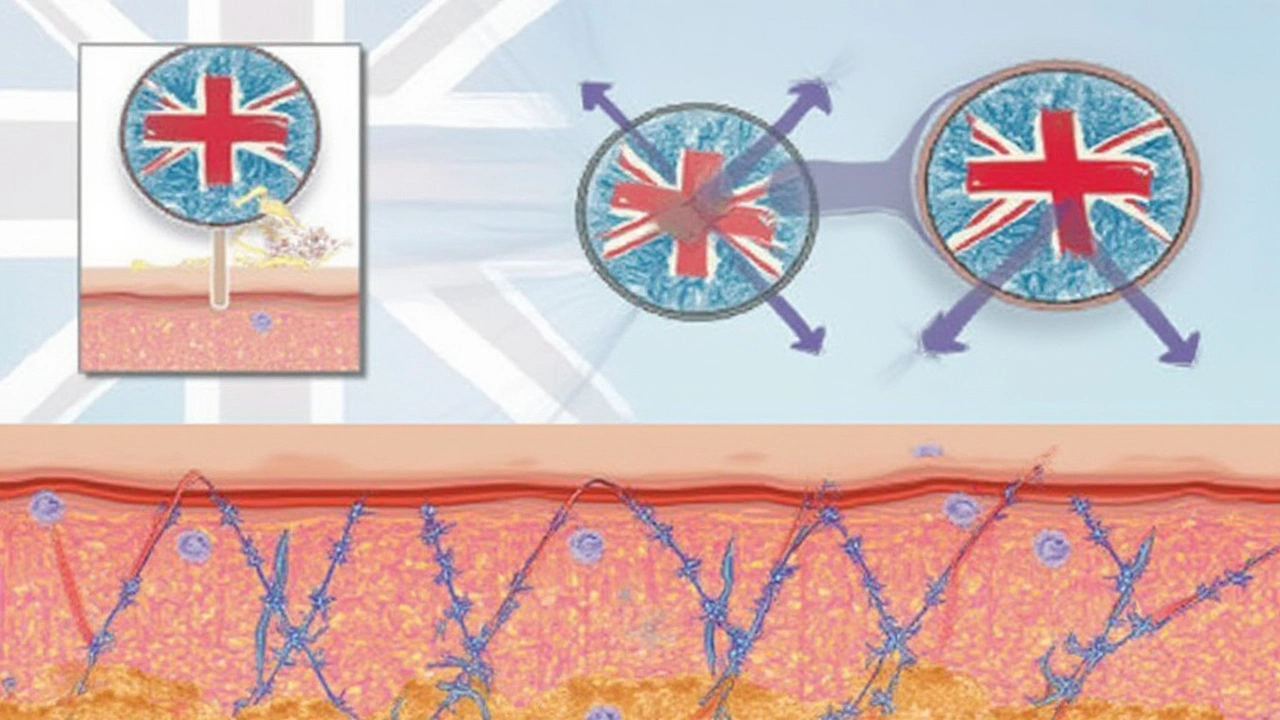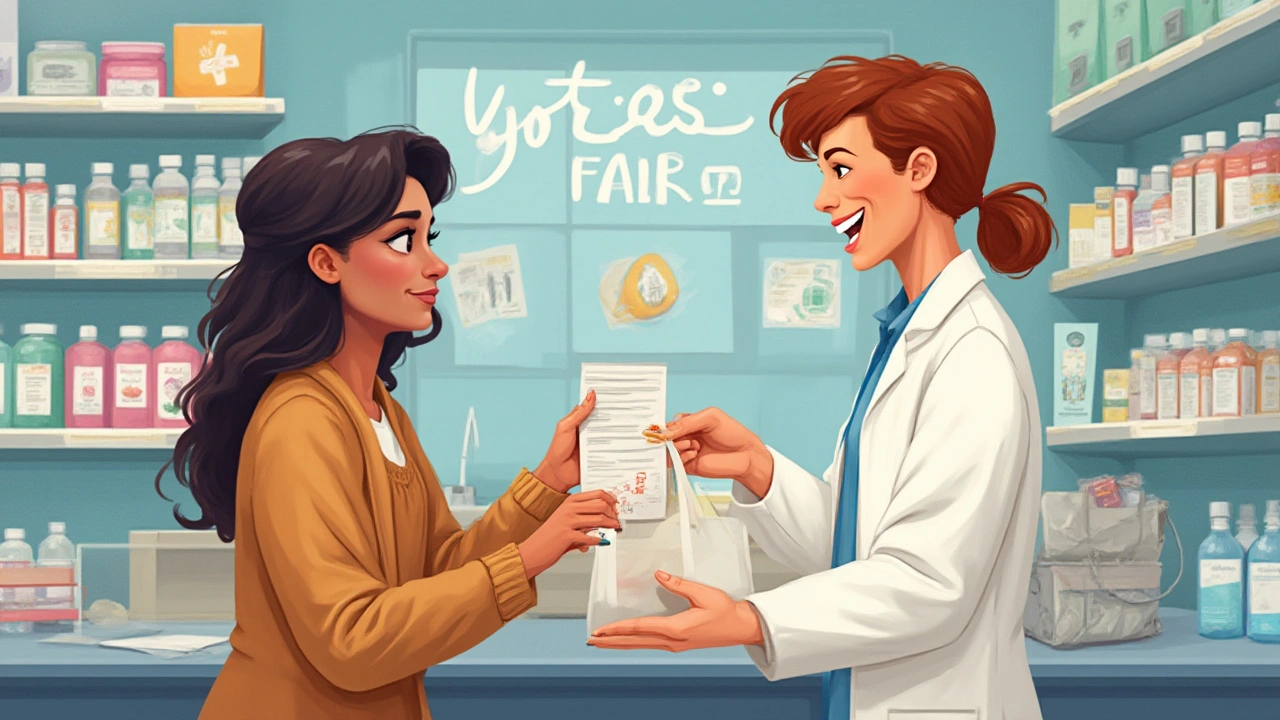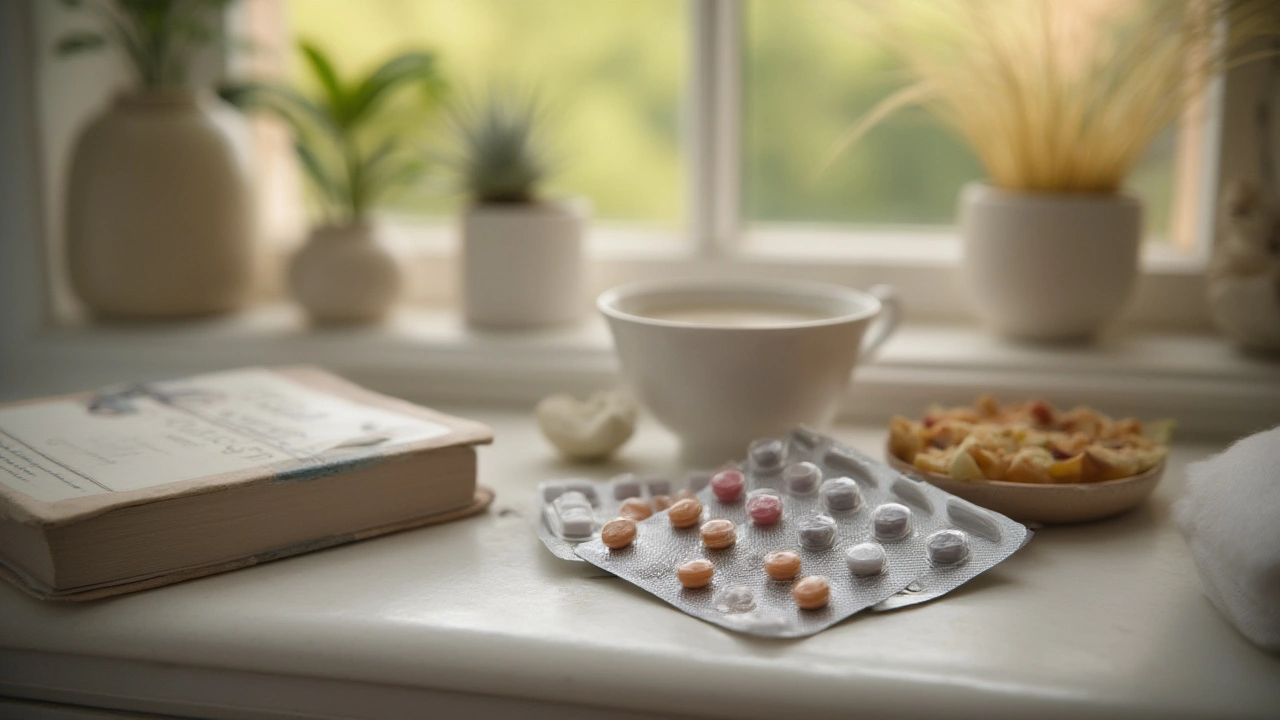Imagine you wake up with a tingling, itchy spot on your lip. You know what's coming—a cold sore. Or maybe you've just been diagnosed with shingles and your skin feels like it's on fire. In these moments, a little blue or white tablet called aciclovir can make a big difference. It's one of those medicine-cabinet heroes most people don't think about until they need it. But when you do, you want the right info, fast, without the fake promises or confusing medical babble.
What Is Aciclovir and How Does It Work?
Aciclovir is not some new kid on the block. It’s been helping people battle viral infections since the late 1970s. Originally discovered as a guanine analog (that’s just a fancy way of saying its structure is a lot like stuff inside our DNA), aciclovir’s claim to fame is targeting herpes viruses—think cold sores, genital herpes, and that nasty rash called shingles. These viruses don’t just vanish after the first round; they hide in your nerves, ready to pop up again.
Here’s the cool part: once you pop an aciclovir pill (or use the cream), your body turns it into a kind of "imposter" DNA building block. When the virus tries to copy itself, it grabs aciclovir instead of real guanine. This trips up the virus’s copying machine, and boom—the virus hits a dead end. Your healthy cells aren’t fooled the same way, so they mostly stay out of the mess. That targeting reduces a lot of side effects you might expect from something trying to stop a virus.
You’ll usually find aciclovir in tablets (200mg, 400mg, or 800mg), creams (like for those dreaded cold sores), and sometimes even IV drips for people with severe infections. It’s one of the earliest antivirals, but it hasn’t lost its spark—doctors still rely on it for many herpes-related troubles worldwide. More than 40 years down the line, this stuff is still a first-line weapon.
Aciclovir might sound really specific—herpes and shingles, that’s about it. But that’s because it’s purpose-built to work against viruses in the herpes family, like HSV-1, HSV-2, and varicella-zoster (the one causing chickenpox and shingles). You won’t find it on the label for things like the flu or COVID-19. And if you try it on some random sore throat? Won’t work—those are likely caused by other bugs.
Ever notice those TV ads that make everything sound glamorous? Aciclovir certainly isn’t one for that. It won’t cure you overnight, but it does hustle—when you take it as soon as you spot those first signs (like the tingling before a cold sore), you can chop days off your outbreak and ease the nastiness. Fast action is the name of the game.
The Common Uses for Aciclovir: Getting Specific
Doctors hand out aciclovir for some very clear situations. Top of the list is herpes simplex, which comes in two flavors: HSV-1 (usually causes cold sores) and HSV-2 (mostly below the belt, causing genital herpes). If you’ve ever had one of those burning, itchy blisters on your lip or somewhere more private, you know how much relief even a modest improvement brings.
But aciclovir isn’t a magic wand. For people with a first-ever herpes outbreak, the antiviral can shorten symptoms by a handful of days, maybe a week. Recurrent outbreaks? If you take it right at the tingle or burn, you can sometimes stop the blister from forming at all. That can make a huge difference if you're prepping for a big date night or a work event.
Shingles—caused by the reactivation of the chickenpox virus in adults—can feel like being stabbed from the inside. Older adults are especially at risk, with blisters that erupt along a nerve path and can leave lasting pain called postherpetic neuralgia. Multiple studies show that aciclovir, when started within 72 hours of the rash, can knock days off the agony and lower the chance of lingering nerve pain. Here’s a quick breakdown in a handy table:
| Condition | Aciclovir Form | Typical Duration | Effect |
|---|---|---|---|
| Cold Sores | Cream/Tablets | 5-10 Days | Shortens healing, reduces pain |
| Genital Herpes (Initial) | Tablets/IV | 5-10 Days | Faster healing, milder symptoms |
| Genital Herpes (Recurrent) | Tablets | 5 Days or Prophylactic | Prevents or blunts outbreaks |
| Shingles | Tablets/IV | 7-10 Days | Shortens attack, prevents complications |
If you have a weak immune system—think cancer treatments or organ transplants—doctors might use aciclovir to keep herpes viruses under control. Babies with severe herpes infections sometimes get it through an IV. Even some healthy folks get daily "suppressive" doses to basically put the brakes on frequent outbreaks.
One thing to know: aciclovir isn’t for every skin rash or fever blister, and it doesn’t do squat for canker sores, which are a different beast entirely. If someone gives you advice that aciclovir is like a catch-all for anything viral, don’t buy it. It targets a tight set of viruses, and that’s where it shines.
So, who should keep a tube or some tablets handy? If you get cold sores every time you see sunlight or run a fever, having some aciclovir on standby is a life hack. The same goes for people dealing with more regular outbreaks. And if you travel or have unpredictable schedules, ask your doc about stocking up before you hit the road.

Dosing, Side Effects, and What to Expect
Dosing aciclovir depends on what you’re battling. For recurring cold sores, creams go right on the sore five times a day for about five days. That’s a lot of dabbing and washing your hands, but it works if you start early. For genital herpes and shingles, tablets come in different strengths and are usually taken anywhere from twice up to five times a day. Forgetting a dose? Best to take it as soon as you remember but don’t double up—your kidneys won’t love it.
The side effect profile is pretty kind, especially compared to old-school medicines. Swallow enough of it (or get it IV), and you might feel a bit queasy or get a headache. Rarely, some folks notice dizziness, diarrhea, or even a rash. Kidney issues can crop up, mostly when people get really high doses or are already prone to kidney problems. Most healthy adults barely notice any issues, but if you have any trouble peeing or start feeling super tired, that’s your body asking for a checkup.
Cats and dogs—my cockapoo Olive would love this—can also run into trouble if they chomp your medicine. Aciclovir isn’t safe for pets, so keep it out of reach (my bearded dragon Pippin is nosey, but he’s not opening pill bottles... yet). If an animal does eat some, call your vet pronto.
Drinking water with your aciclovir is smart because it helps flush everything out nicely. Skipping doses won’t help, but taking more isn’t the answer either. In most cases, if you’re using aciclovir for recurring herpes, your doctor may let you keep extra at home so you can start treatment at the first sign of trouble—don’t wait for full-blown blisters.
What about mixing with other meds? Aciclovir generally plays well with others, but certain diuretics or medicines that affect your kidneys can add risk. Always run new meds or supplements by your doctor or pharmacist.
Pregnancy is a common question. Data over the decades says aciclovir is among the safer bets for pregnant people who need to treat serious outbreaks, especially late in pregnancy to prevent passing herpes to a newborn. Still, nothing beats checking with your doctor before starting it.
Troubleshooting: When Aciclovir Isn’t Enough
It sounds great when it works, but what if aciclovir just… doesn’t? Every so often, someone runs into a stubborn strain of herpes that has figured out how to dodge the drug. This usually shows up in people who use the medicine for long periods, or who have really weak immune systems. When that happens, doctors will swap to a different antiviral, like famciclovir or valacyclovir, which are newer cousins with some tricks up their sleeves.
If you keep getting outbreaks, even on aciclovir, don’t just up your dose. Write down what’s happening, snap some pics if you’re comfortable, and talk to your healthcare provider. Sometimes it takes adjusting the regimen, sometimes changing the medication, sometimes just adding a little time and patience. Herpes can be stubborn, but so is modern medicine.
Home remedies don’t have the evidence to back them like aciclovir does. Putting toothpaste on a cold sore or dabbing with apple cider vinegar? That’s a recipe for burning skin or a mess—and won’t make the virus disappear. What works is catching outbreaks early, sticking to your prescribed doses, and telling your doctor if something feels "off" or unusually severe.
Traveling with aciclovir is easy—just keep pills in their original packaging, and bring along a note from your doctor if you’re crossing borders. Herpes stigma is starting to fade, but people are still shy about it. Remember, roughly 3.7 billion people worldwide carry HSV-1. You’re not alone.

Storing, Using, and Living With Aciclovir
Here’s the everyday stuff that trips people up: where do you store it? Aciclovir is pretty forgiving. Keep tablets in a dry, cool spot—not in that humid bathroom medicine cabinet where they can go all mushy. Creams should be tightly capped and away from sunlight. Tablets can last up to three years if sealed, but always check the expiry before popping one, especially if you only use them once in a blue moon.
Carrying aciclovir around is fine; it doesn’t require refrigeration. But if you spot any color changes, odd smells, or the cream goes crusty, toss it. That’s a sign something went wrong. Don’t share your supply, even with partners who have similar symptoms—everyone’s infection and immune status are different, so personalized dosing matters.
For everyday living, hydration is your friend. Drinking more water not only helps move aciclovir through your body but also supports your immune system. Stress and sun exposure can trigger outbreaks, so if you’re prone, carry lip balm with sunscreen and consider stress-busting activities. Yoga works for many, but honestly, even playing fetch with Olive works wonders for my mood.
Sexual partners should know about your herpes status. Honest conversations can spare awkwardness and keep everyone safer. Condoms help but aren’t a perfect shield, since the virus can lurk in places not covered. Aciclovir doesn’t stop you from catching or spreading herpes; it just makes life with it a ton easier.
And one final pro tip: if you’re into sports or sharing towels, keep them washed and separate during an outbreak. Herpes can spread through direct skin contact, so a little cleanliness can save a lot of trouble. Work with your doc—not against them—and you’ll navigate aciclovir like a pro. Expect fewer miserable days, not a miracle cure, and you won’t be disappointed.


11 Comments
suresh mishra
July 18, 2025 AT 05:50Great post! Aciclovir is definitely a crucial drug for managing herpes infections. It works by inhibiting the replication of the herpes virus's DNA, effectively stopping the virus from multiplying.
One of the tips I would add is to start the medication as soon as symptoms appear for better results, since the earlier it’s taken, the more effective it is in halting an outbreak. Also, it’s important to maintain a full course even if symptoms improve quickly to prevent the virus from becoming resistant.
I'm curious though, does the post mention any side effects? It's good to know because patients often worry about that.
Reynolds Boone
July 22, 2025 AT 18:10Yeah, I was wondering about the side effects as well. From what I know, aciclovir is generally well tolerated but some people report nausea or headache. Has anyone here used it for cold sores? How quickly did you notice improvement?
Also, does it have any issues with drug interactions? I've seen some antivirals that you can't mix with certain other meds.
Angelina Wong
July 25, 2025 AT 21:10I've been prescribed aciclovir a few times for cold sores, and honestly, it really helps shorten the healing time if you start early. Usually, within a couple of days after starting the treatment, the symptoms begin to subside.
Regarding side effects, it's true they are mostly mild. I have experienced slight nausea once but nothing too severe.
It's always a good idea to follow the dosage carefully and check with your doctor about any other medications you're taking, especially if you're on anything like immunosuppressants.
Patrick Fithen
July 29, 2025 AT 02:57Thinking about the broader perspective here, isn't it fascinating how a single drug can target such a specific viral mechanism? The way aciclovir mimics the nucleotides and gets incorporated into viral DNA, causing chain termination, is a neat molecular trick.
This also raises philosophical questions on how modern medicine manipulates biological systems so precisely.
I also wonder about the accessibility of this medication globally, especially in less developed regions where herpes can cause significant stigma.
Michael Leaño
July 30, 2025 AT 15:04Absolutely, the science behind aciclovir is really impressive, but what’s more important is how it empowers people to manage what can be a very distressing condition.
From what I’ve seen, those who take the drug early and follow treatment plans closely often feel a lot more in control and less anxious about outbreaks.
Encouragement to seek early treatment is key, since sometimes folks just hide their symptoms due to embarrassment.
Anirban Banerjee
August 1, 2025 AT 00:24I must stress, aciclovir should be used under strict medical guidance. Self-medicating, especially with antiviral drugs, can result in improper dosing and potential resistance development.
In India, where the viral load can be high in some communities, educating patients on timely intervention and adherence to prescribed dosages is paramount.
Furthermore, comprehensive patient counseling should always accompany the prescription of aciclovir.
Mansi Mehra
August 2, 2025 AT 04:10While I agree with the importance of formal administration, let’s not forget that many informational articles are often too vague or inaccurate about how medications work.
This post does a fair job, but I noticed it doesn’t clarify that aciclovir is only effective during active viral replication and won’t cure herpes entirely.
Such nuances are vital as people shouldn’t expect a magical cure but rather a management tool.
Jagdish Kumar
August 3, 2025 AT 19:04This entire discussion is quite delightful in its depth, yet I feel compelled to highlight that in many cases, the societal dramatization of herpes as a 'shameful' disease often exacerbates the psychological burden.
The role of aciclovir in alleviating physical symptoms, therefore, also serves an unspoken but crucial role — liberating individuals from unnecessary self-stigmatization.
That alone is worth applauding.
Aminat OT
August 5, 2025 AT 12:44Honestly, I think we need to talk more about emotional aspects here. It’s not just the drug or medicine but what it means to people living with herpes.
Sometimes the mental weight is heavier than the physical, and a drug like aciclovir might not ease that part.
Folks need support groups and understanding, not just pills.
Amanda Turnbo
August 7, 2025 AT 17:30True, and yet, posts like this must maintain professionalism and focus on factual information. While empathy is essential, misinformation can cause harm.
The post served well as an introductory piece on aciclovir but readers should always consult qualified healthcare providers for personalized advice.
Drug therapeutics is a serious matter that deserves seriousness, not casual speculation.
Jenn Zuccolo
August 17, 2025 AT 05:50Adding onto the conversation, it’s worth noting that medicines like aciclovir are nonetheless symbolic of how we attempt to exert control over natural afflictions that have confounded humans for ages.
This interplay between biology, medicine, and human experience is quite poetic, blending cold science with hope.
In some ways, aciclovir doesn’t just stop herpes; it stops helplessness.